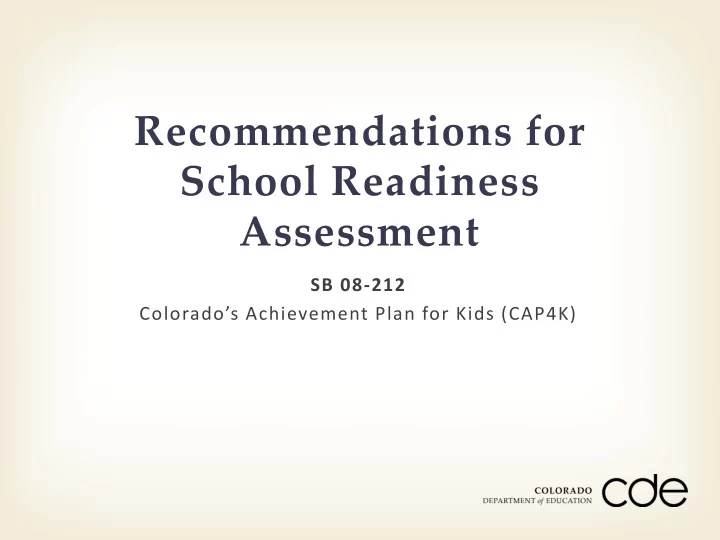

Recommendations for School Readiness Assessment SB 08-212 Colorado’s Achievement Plan for Kids (CAP4K)
Overview of School Readiness within CAP4K Requirements of State Board Define school readiness Adopt one or more assessments aligned with definition of school readiness Requirements of local education providers Beginning in the fall of 2013, ensure all children in publicly funded preschool or kindergarten receive an Individual School Readiness Plan Administer the school readiness assessment to each student in kindergarten
Parameters for School Readiness Assessment Adopted School Readiness Assessments must be: Research-based Recognized nationwide as reliable for measuring school readiness Suitable for determining instruction and interventions to improve student readiness Inclusive of physical well-being and motor development, social and emotional development, language and comprehension development, and cognition and general knowledge School readiness assessments shall not be: Used to deny admission or progression Reported at the individual student-level Following adoption of the school readiness assessment, the state board is required to adopt a system for reporting population-level results that provide baseline data for measuring overall change and improvement in students' skills and knowledge over time.
State Board of Education Adopted Assessment Attributes (December 2010) Agreement: SBE agrees that school readiness assessments will include primarily a mix of state-approved formative and interim assessment tools 1. CDE recommends that the Colorado Basic Literacy Act (CBLA) be updated to align with the PWR Colorado Academic Standards and that numeracy be added to reflect the same instructional values of progress monitoring and early intervention where needed. 2. The state will offer districts a menu of approved school readiness assessment tools. 3. In preschool through second grade school readiness assessments will rely on formative assessment practices and interim assessments. 4. In grades 1-2 mastery of the PWR Colorado Academic Standards will be measured. 5. Districts are encouraged to introduce developmentally appropriate end-of-year assessments.
Recommendation Development Process Outreach • August 2012 and ongoing • Representatives from districts, • August – September, 2012 Early Childhood Leadership • Members of the 2010 CDE • August – November, 2012 Commission, preschool programs, Assessment Committee • Superintendents’ Advisory early childhood advocacy and • Purpose: Review specific Councils and public meetings foundations assessment tools • Role: Advise the department on • Purpose: Gather input to implementation of SB 08-212 inform department school readiness provisions recommendations on assessment tools and Assessment School Readiness implementation considerations Subcommittee Advisory Committee
Results and Recommendations from the School Readiness Assessment Subcommittee Results: Only one assessment, Teaching Strategies GOLD, met all requirements and desired attributes. Two other assessments also received high scores, High Scope COR and Desired Results Development Profile; however, the technical reports are still in development. Recommendations: Offer districts a menu of assessments from which to choose Approve Teaching Strategies GOLD for the menu Pending acceptable technical reports, add High Scope COR and Desired Results Development Profile to the menu
Recommendation CDE recommends that the State Board of Education: Offer districts a menu of school readiness assessments Approve Teaching Strategies Gold as the first school readiness assessment tool for the menu Pending positive technical reports and final review, approve additional school readiness assessment tools for the menu
CDE Implementation Timeline : Districts Phase-in School Readiness Requirements Over Two Years Description Benefits Limitations Considerations District phase-in school Allows ready districts to Not all kindergarten Question related to • • • readiness plans and move forward with students are included in change in legislation assessment over two-years implementation year one Utilizes lessons from Perception that the state • • 2013-4: Ready districts phase one district is reluctant to implement TS GOLD and implementation to implement a key school readiness plans inform phase two provision of CAP4K Allows for consideration • 2014-5: All districts of assessments currently implement an assessment being validated from the menu and school Allows for more reliable • readiness plans implementation over time resulting in higher quality data Supportive of paradigm • shift needed for K reform Allows for sufficient • training
Recommend
More recommend